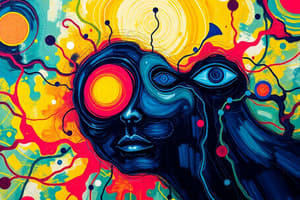Podcast
Questions and Answers
What does functionalism suggest about mental states?
What does functionalism suggest about mental states?
- They are defined by their physical composition.
- They are identified by what they do. (correct)
- They are inherent and unchangeable.
- They are irrelevant to behavior.
What is an example of an archetype identified by Carl Jung?
What is an example of an archetype identified by Carl Jung?
- The Hero (correct)
- The Parent
- The Scholar
- The Performer
What is the primary definition of consciousness in psychology?
What is the primary definition of consciousness in psychology?
- The ability to perform cognitive tasks.
- The awareness of thoughts, feelings, and perceptions. (correct)
- The state of being unconscious.
- A physical process occurring in the brain.
Which of the following best describes Sigmund Freud's division of the unconscious mind?
Which of the following best describes Sigmund Freud's division of the unconscious mind?
Which philosopher is known for proposing the theory of dualism?
Which philosopher is known for proposing the theory of dualism?
What condition does amnesia reveal about memory and consciousness?
What condition does amnesia reveal about memory and consciousness?
What significant issue does dualism raise regarding the mind and body?
What significant issue does dualism raise regarding the mind and body?
What does the concept of 'blindsight' refer to?
What does the concept of 'blindsight' refer to?
What does materialism suggest about the relationship between consciousness and brain activity?
What does materialism suggest about the relationship between consciousness and brain activity?
What aspect of consciousness does perceptual priming affect?
What aspect of consciousness does perceptual priming affect?
How does functionalism differ from dualism and materialism in its approach to consciousness?
How does functionalism differ from dualism and materialism in its approach to consciousness?
According to Carl Jung, what does the collective unconscious contain?
According to Carl Jung, what does the collective unconscious contain?
Which of the following statements best reflects a materialist perspective on emotions?
Which of the following statements best reflects a materialist perspective on emotions?
What is the primary feature of the 'inferiority complex' proposed by Alfred Adler?
What is the primary feature of the 'inferiority complex' proposed by Alfred Adler?
Which theory emphasizes a direct relationship between brain activity and conscious experiences?
Which theory emphasizes a direct relationship between brain activity and conscious experiences?
What aspect of consciousness do cognitive processes primarily relate to?
What aspect of consciousness do cognitive processes primarily relate to?
Flashcards are hidden until you start studying
Study Notes
What is consciousness?
- Consciousness is the state of being aware of our thoughts, feelings, and surroundings.
- It is the foundation for cognitive and emotional processes.
- It enables us to understand and interact with the world around us.
Theories of Consciousness
- Dualism: Proposes a separation between the mind (non-physical) and the body (physical).
- Materialism: Asserts that consciousness arises from physical processes in the brain.
- Functionalism: Focuses on the functions and adaptive roles of consciousness.
Dualism
- René Descartes is credited with proposing this theory.
- The "Mind-Body Problem" poses the question: how can an immaterial mind influence a physical body, and vice versa?
Materialism
- Emphasizes the relationship between brain activity and conscious experiences.
- Neuroscience supports this theory with its findings about the brain's connection to consciousness.
- Examples include the effects of caffeine on alertness, and antidepressants changing mood by adjusting neurotransmitter levels.
Functionalism
- Consciousness serves a purpose in helping individuals adapt to their environment.
- Mental states are defined by what they do, not what they are made of.
The unconscious mind and behavior
- The unconscious mind is a realm of the mind that operates outside conscious awareness.
Carl Jung
- Introduced the concept of the "collective unconscious," a shared pool of universal symbols and archetypes.
- Archetypes represent common human experiences and are found across cultures.
- Some examples include the Hero, the Shadow, and the Anima/Animus archetypes.
Other notable figures
- Sigmund Freud proposed the idea of the unconscious mind being divided into the id, ego, and superego.
- Alfred Adler developed the "inferiority complex", suggesting that feelings of inadequacy can drive behavior and motivate individuals to strive for superiority.
Cognitive processes and consciousness
- The way we perceive the world, our memories, and how we perceive our own bodies are all influenced by consciousness.
Visual Perception
- Motion-induced blindness: Occurs when our brains selectively attend to moving objects, causing us to miss static objects in our field of vision.
- Blindsight: A condition where individuals can respond to visual stimuli without being consciously aware of seeing them.
Memory
- Amnesia: Loss of memory can disrupt our sense of self and continuity of conscious experience.
- Perceptual priming: This refers to how previous exposure to a stimulus can influence our response to related stimuli.
Studying That Suits You
Use AI to generate personalized quizzes and flashcards to suit your learning preferences.




